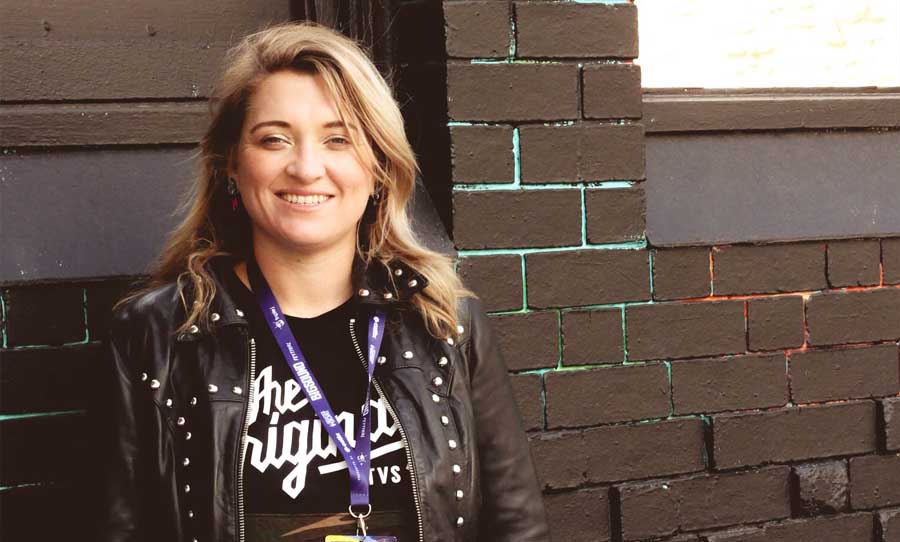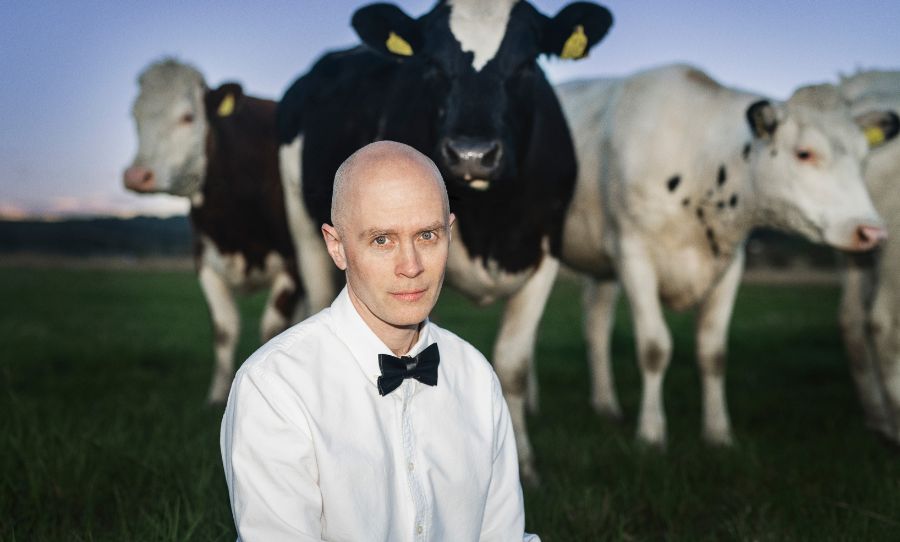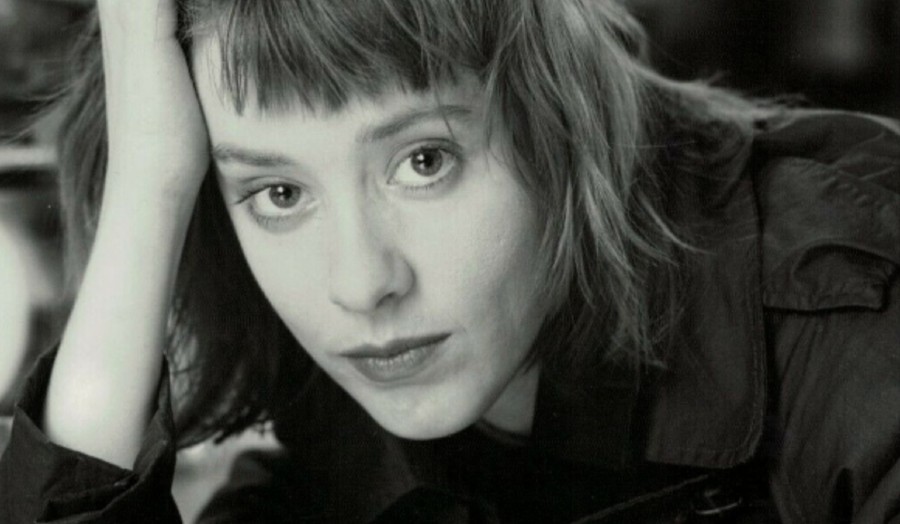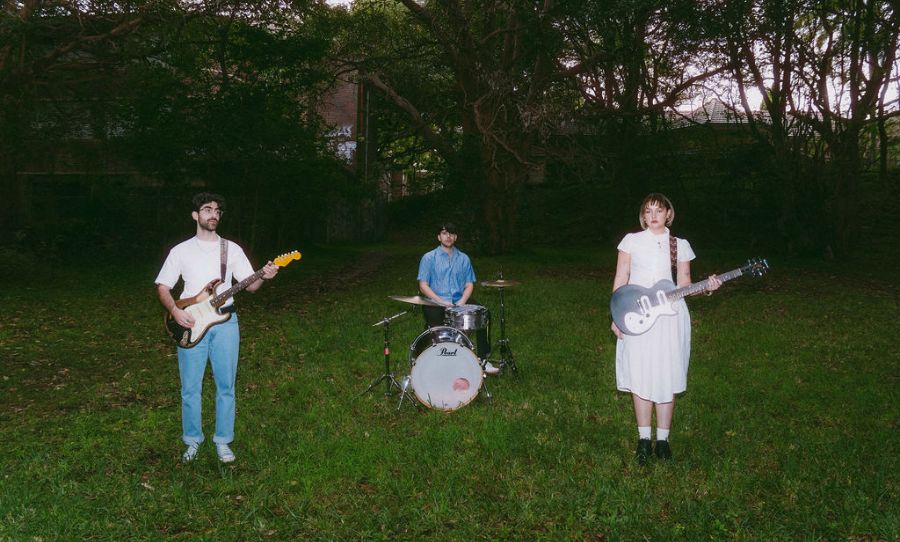For the first time in 2018, BIGSOUND appointed an official First Nations Producer in Alethea Beetson. Though as Alethea will assure you, the festival has spent years supporting indigenous Australians in the arts – and will continue to under her direction.
While up at BIGSOUND we sat down with Alethea to chat about the new role, her predictions for the future, and how the music community can continue to support First Nations people.
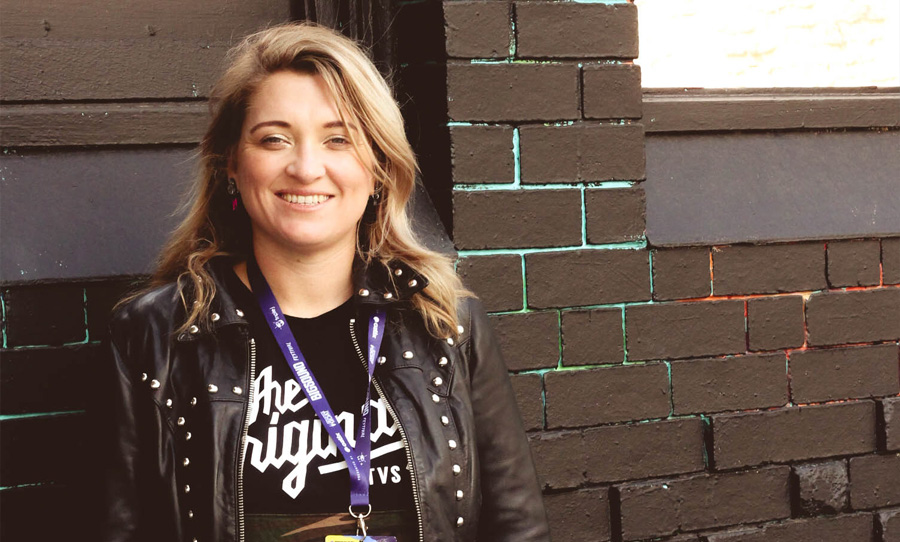
After listening carefully to their community, BIGSOUND appointed their first-ever First Nations Producer in 2018. Where does Alethea Beetson see the festival, and Australian music, going in the future?
HAPPY: First thing – I’ve seen you mention that before your role existed, there had been a huge amount of work that had gone into BIGSOUND for First Nations people. What kind of programs or initiatives have gone by that people may not necessarily be aware of?
ALETHEA: BIGSOUND have always been doing things and I’m learning that as I go along. They’ve always been doing things, but also the thing that I was referring to has been the people coming to this event and contributing to it through their interactions with individuals and their interactions with panels, and just enjoying the festival. The indigenous community, we want to and will always find each other. We just had a session and we noticed we had seen each other at all these different showcases, all the artists go around and support one another. So our sense of community, it’s with us in every single thing that they do, and it’s through that we’ve been contributing to this event since its inception. And then prior to that, the indigenous people who have created pathways for other indigenous people that we’re seeing here, this year, able to do their thing.
HAPPY: That’s really nice. It’s less on the programming side, or not really anything that’s been given a name or title. That’s really powerful.
ALETHEA: Yeah and you know, BIGSOUND have had initiatives and will continue to have initiatives and have definitely increased their focus this year, but our community has always been working in this space and have responded to the call for First Nations music to have an even more front-and-centre role in spaces like this.
HAPPY: What was that moment that was ‘ok, we need to appoint a First Nations Producer’?
ALETHEA: I can’t speak to that, but I think that I find working at BIGSOUND one of the most open-eared organisations that I’ve worked at, and I’ve worked across a number of organisations. I actually realised the other day that since 2009, I’ve been the first person in a role… so it’s kind of an interesting place to reflect in, because I can see how other institutions have responded to having someone come in and do this kind of work. And they listen really, really openly, and listen to what the community has been telling them. They have heard from the community that we need to see more change in this direction so they have through this role, and they also understand that this is the first step in a long journey. It’s a journey that involves many many people.
HAPPY: I’ve found the same thing, up here.
ALETHEA: That’s great!
HAPPY: They didn’t make a big fuss about the gender diversity this year, but they nailed that as well. Like, every great act I saw last night was female-fronted.
ALETHEA: Yep, absolutely.
HAPPY: Did you have a relationship to BIGSOUND before this year?
ALETHEA: So I’ve only been coming to BIGSOUND for two years but I’m been aware of the festival side of things for a long time. I also have worked with Digi Youth Arts, which is an indigenous youth arts organisation. We have music programs and are hopefully developing some of the next generation of our upcoming First Nations acts over the next 18 years, so I’ve been attending to represent that organisation. I want one of the young people to come and represent Digi Youth Arts next year, because I think it would be really nice for an indigenous youth arts organisation to send an indigenous young person.
HAPPY: It does make sense, doesn’t it?
ALETHEA: So I’m really hoping to see that, since the relationship I have with the festival had to change, the relationship with Digi Youth Arts has to change. I’m hoping the young people from the organisation, next year, will be here.
HAPPY: I’m looking forward to looking up some of those artists!
ALETHEA: Yeah! So we’ve got some First Nations volunteers on the festival this year, and they’ve come through Digi Youth Arts as well, and it’s been good because they’ve got to learn a whole other different process, and a whole other side of the arts sector. It’s been a really positive experience for them.
HAPPY: And they’re the artists within that foundation?
ALETHEA: Yes, there’s an actor, a visual artist, and someone who does music and acting.
HAPPY: Right. I think coming to something like this is really awesome for musicians especially, because they see the level that young Australians are performing at. It can be really inspiring.
ALETHEA: Yeah.
HAPPY: Moving on. I do think there’s been a big upswing in indigenous representation in the arts over the last 12 months. Not that there isn’t still a mountain of work to be done, but looking forward do you see that positive trend continuing in an exponential fashion?
ALETHEA: I hope so. I am optimistic, I’m not suggesting that change is going to be easy, it’s going to come with its difficulties, but we’re in a really exciting time for all indigenous arts – particularly music – because of the work people have put in before us. I just learned, at one of the First Nations meet-ups, that when they started in media 20 years ago there was, like, one release a year. Now, there’s so much music released in just this year, so I think it’s really exciting times and I’m really enjoying seeing artists make music, as we always have done, across all genres. We can continue our storytelling in any way we want to and I’m really excited to see that, I’m looking forward to seeing where that energy goes. We’re hopefully in a time where we don’t have to continually remind everyone that we’re still here, we can just celebrate the amazingness of our culture and our heritage, which I think so many artists have been doing and are doing, and hopefully we can continue to share that with as many people in the wider community as possible.
HAPPY: It’s exciting for sure, but do you think in the last 12 months specifically there are still any issues lagging behind?
ALETHEA: I think representation is still something we’ve got to work towards, and that’s going to be ongoing for a while. I think ensuring that First Nations people have agency and are representing themselves the way they want to is still an issue, that’s really important, that we continue to build pathways for indigenous people to be working across all sectors of music, and the wider arts industry as well. I think there are probably a lot of conversations that we still need to have, I wouldn’t want to predict those conversations because they have to come from the community, but I do think over the next 12 months we’re actually going to start seeing some of the conversations that pull these things apart so we can really discuss and really find solutions to move forward together.
HAPPY: Speaking of events like BIGSOUND, are there any other festivals or parties that you see as doing a really great job in terms of representation?
ALETHEA: I really enjoyed APAM this year, admittedly it was my first time at the Australian Performing Arts Market. So I did some work through BlakDance this year through the Original People’s Party – the fact that they had a party called the Original People’s Party was pretty amazing. For one night for about four hours, First Nations People took over the venue and just put on an amazing party with First Nations artists, it was so great. It was just this explosion of culture and celebration, and people making works across all spectrums of the arts, genres, and what people tried to define as traditional and contemporary – which I kind of like to look at as ancestrally connected works. So I think the way that rolled out this year was just an exemplar of what happens when people just give us the space to do things our way, and we invite you in to see our culture. For all the amazing-ness that it’s worth.
HAPPY: Sounds awesome.
ALETHEA: It was. It was so good! And it was just the coolest name too – ‘Original People’s Party’.
HAPPY: I love that. So this one I’m asking from the perspective of a publisher…
ALETHEA: Okay, sure.
HAPPY: …because I don’t see it discussed a whole lot. How can Australian media can contribute to First Nations artists in a positive way?
ALETHEA: I’ve seen this come up a lot in, you know, my own Facebook News Feed or on Twitter, other people talk about this and I’m aware of it myself as someone who gets approached to do a lot of things on NAIDOC Week, or Reconciliation Week. And whilst I acknowledge in my community what role those weeks can play and how important they are, we exist all year around and we should be acknowledged and put to the front all year round. So making sure that there’s that consistency. I was doing an interview recently and a young person asked me what are some ways we can make sure that we’re learning as much as we can from other people, just on a day-to-day basis. She said ‘oh I’ve heard of decolonising your Instagram feed’ and I was like, ‘what’s that?’ But it’s making sure that you’ve got multiple sources of information. Michelle Law, in an intersectional feminist panel that I did, talked about looking at your reading list, and if your reading list is all non-indigenous people or white people… I think whatever your methodology is around finding your information, actually looking at it and seeing if it is creating roadblocks for any group of people, try to remove those roadblocks.
HAPPY: Interesting. The two ways I see coverage right now is first a sort of ‘loud’ coverage, which is naming a program or doing something like NAIDOC Week. Then there’s the ‘quiet’ coverage, which is where you just… do it.
ALETHEA: Taking this in a programming perspective, you can say ‘here is a First Nations panel’ – a conversation about First Nations people, obviously led by First Nations people. But here you might say ‘here’s a discussion on a different topic…’
HAPPY: That includes a First Nations person.
ALETHEA: That includes a First Nations person or two! Because they can provide perspective on a range of things, and when you apply their lens to an issue, that’s going to provide a different and meaningful perspective that adds to the entire discussion.
HAPPY: Do you think a certain idea, out of those two, is more powerful?
ALETHEA: It’s hard to say, I think it’s all powerful and I think it’s all needed. I mean I’m always going to feel really empowered in a room full of First Nations people leading a discussion, but I understand why all kinds of approaches to these things are needed.
HAPPY: Do you think think what I called the loud support is necessary, or leads to, a greater amount of inclusive support?
ALETHEA: I think loud support can, it just needs to come from a really meaningful place, and therefore not tokenistic. It has to be something that’s going to be… I was talking before about taking the first steps in a really long journey, trying to get things right.
HAPPY: Thanks, that’s really important to me, and Happy at the moment.
ALETHEA: That’s great! I’m glad that was helpful.
HAPPY: Now just to finish off, we are at BIGSOUND so I’m going to ask – who have you seen up here, on the music side, who really impressed you?
ALETHEA: Last night there were a lot of First Nations artists, so I was really excited to see all of them. The Merindas, they were really fun, amazing, and just the loveliest women you will ever meet. Nooky did an amazing job at his showcase.
HAPPY: I was really sad I missed Nooky.
ALETHEA: He’s a good time, just a really great person as well. Also I caught Wildheart, a Brisbane hardcore band, their frontman is an indigenous man – really cool.
HAPPY: I saw maybe two songs of theirs. So much energy!
ALETHEA: It was really cool, I was really excited about that last night. I wanna look up the lyrics to fully understand what they were saying, I was like ‘I bet you’re saying something I’ll love!’
